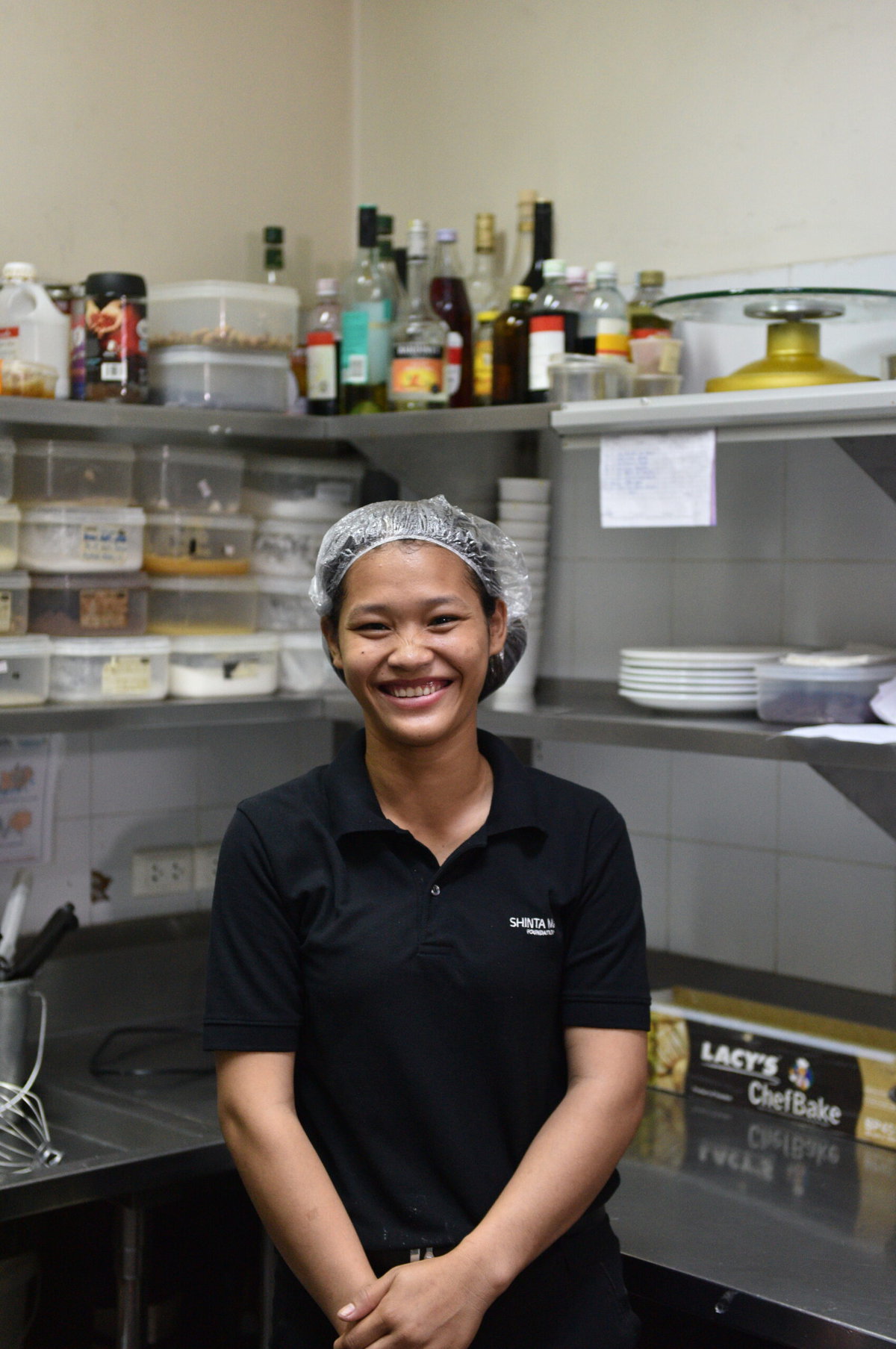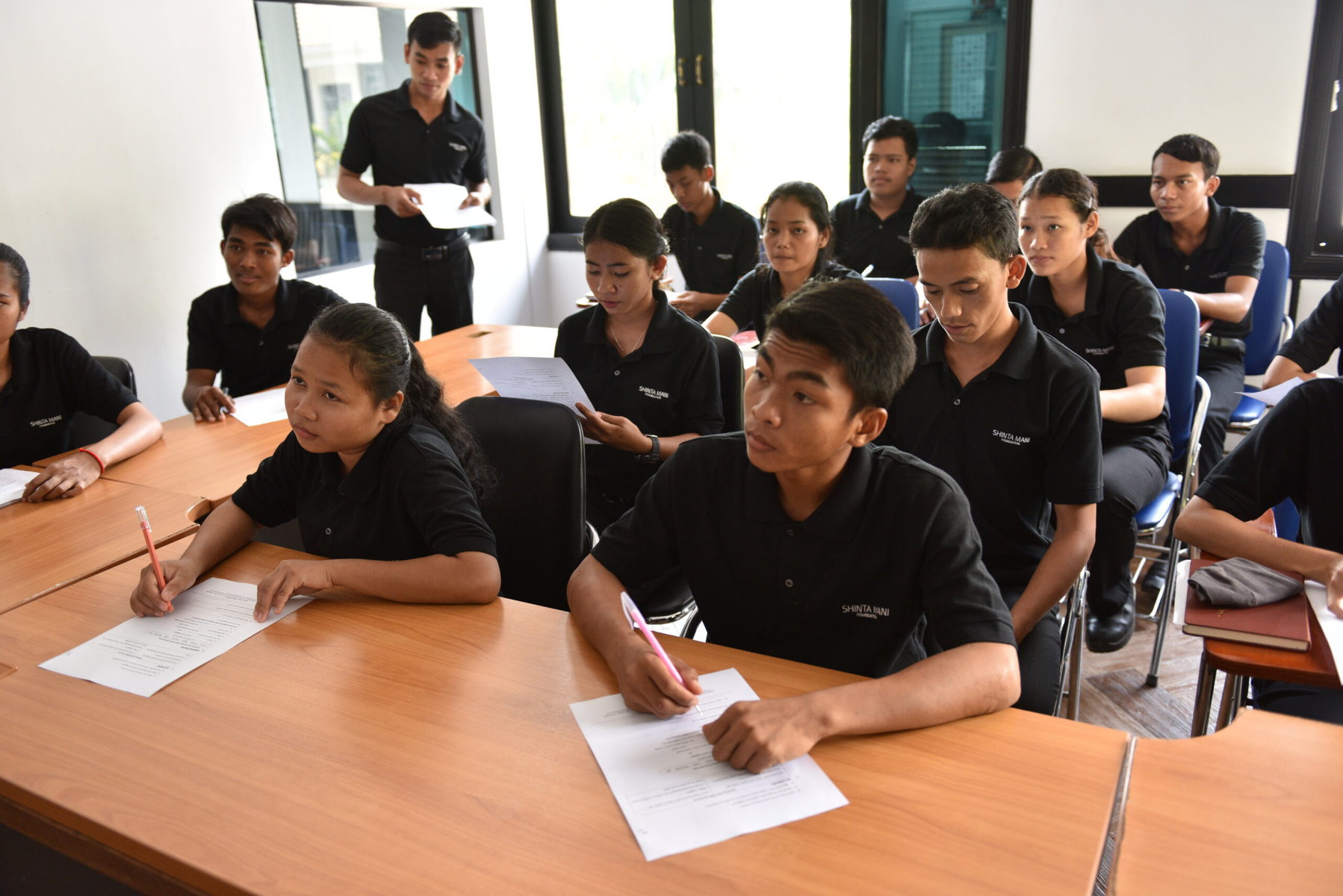Inside the Shinta Mani Angkor and Bensley Collection Pool Villas property in Siem Reap, Cambodia, the rules of time and space seem to bend. Exploring the grounds, guests get a sense of what the ancient Angkorian temples might look like had they been built in this century. Covered hallways flanked by ponds are reminiscent of those that carry tourists from one part of Angkor Wat to the other, and water pours from fountain fixtures shaped like Hindu emblems into the private plunge pools accessible from each villa. Traditional artwork (including sculptures that resemble the spires that top pagodas around town) complements the modern black-and-white patterns found on everything from the floors to the poolside chaise longues.
But it’s the classic Khmer hospitality that makes the Shinta Mani experience so memorable: Local staff members greet guests with a small bow, hands pressed together, offering smiles so warm as to be instantly disarming.
Shinta Mani Angkor is more than just a five-star luxury hotel in Cambodia’s Temple Town. It’s also a social enterprise that’s empowering local communities. Five percent of revenue from the hotel — along with its two sibling properties in Cambodia’s Cardamom Forest and Nepal — goes to the Shinta Mani Foundation, an NGO that started in 2004 with the opening of the Shinta Mani Hospitality Training School.
“The hospitality school was created because we didn’t have any choice,” Bill Bensley, interior designer and co-founder of Shinta Mani, explains. “There were basically no other hotels or anybody who knew what a hotel was.” Seeing the lack of qualified hospitality staff available in Siem Reap, Shinta Mani’s founders set about developing their own.
Now, 20 years after its founding, the Shinta Mani Hospitality Training School hosts a class of around 34 young adults each year for a 10-month program. Students — who are between 17 and 24 years old and come from underprivileged backgrounds — learn English, computer skills and life skills. They also choose areas of specialization: finance, front office, housekeeping, maintenance, food and beverage, and spa therapy. $3,000 is enough to support a student for one year, giving them access to room and board as well as a small stipend of rice and cash they can use to support their families.
Crushed by negative news?
Sign up for the Reasons to be Cheerful newsletter.
The hospitality school is not the only one of its kind — students can pay to study hotel management in the city’s universities or receive scholarships to other NGO hospitality schools like Sala Bai and École d’Hôtellerie et de Tourisme Paul Dubrule. But unlike Sala Bai and Paul Dubrule (which include on-site “training hotels” with only four to six rooms), the Shinta Mani Hospitality Training School has its own full-scale luxury hotel just steps from the classroom. That means students get easy access to hands-on practice at Shinta Mani Angkor during internships, which comprise six months of their training.

Acting director of the Shinta Mani Foundation, Chhunnin Neat, is the product of a hospitality school herself. “I’m living proof — we’re really making lives better,” Neat says. After growing up in “a really poor village” outside of the city, Neat received a scholarship to Sala Bai, where she studied housekeeping before landing a job in a high-end hotel in Siem Reap. Over the years, she worked her way up from housekeeping to the food and beverage department and then the front office. Eventually, Neat returned to school to get her degree in accounting and then worked in bank microfinancing, which got her a gig assisting the Shinta Mani Foundation with its small business loan program. When she visited her hometown after building her career, Neat saw the people who she’d grown up with were still there, now married with children. That’s when she realized: “Their lives are really hard.”
This is where the work of the Shinta Mani Foundation comes in: It gives locals the tools they need to escape the cycle of poverty. Projects like the hospitality school are helping to usher Cambodia into a new era, and just in time. Right now, the country’s economy is growing so quickly it’s outpacing the local labor force. According to the World Bank, 89 percent of jobs in Cambodia are considered “low-skilled,” which will have to change as the nation approaches its goal of reaching high-income country status by 2050.
Siem Reap’s hospitality industry still relies on foreign workers for many management positions, such as Shinta Mani Angkor’s former general manager Ewan Taylor, originally from South Africa. But that may not be the case for much longer. “There is no reason for the next generation [of locals] to not be GMs,” Taylor says. “It should be them running the hotels, not us.”

Monirath Mon, a 2023 graduate of the Shinta Mani Hospitality Training School, is part of that next generation. After she graduated from high school, Mon’s family didn’t have enough money to pay for university tuition. “My family wanted me to work first,” she says. According to Bensley and Neat, this is fairly common: Parents in the small villages outside of Siem Reap expect their children to contribute to the family income right away. That’s often how young people get stuck in so-called “low-skilled” jobs, without the opportunity to progress in their careers. At the Shinta Mani Hospitality Training School, Mon says, she and her peers “have the same situations in our families,” which helps them work together and learn from each other.
Mon is currently working as a receptionist at Shinta Mani Angkor, but her next goal is to become a front office manager. “And after that, I will improve myself to become a hotel manager,” she announces proudly. The hospitality school has allowed Mon to dream big: “Our teachers helped us find direction. They told us to think what we want in the future, and they told us to love what we do every day so that one day we will achieve what we want.”
In addition to the hospitality school, the Shinta Mani Foundation funds a number of other projects whose impacts resound through local communities. These include the construction of homes in poor villages outside of Siem Reap, the distribution of baby formula to mothers in an effort to ward off malnutrition, health and dental care for villagers, a business loan program available to local entrepreneurs, and the conservation of the Cardamom Mountains rainforest where the Shinta Mani Wild property is located.
The progress the Shinta Mani Foundation has made became apparent last December, Bensley says, when Shinta Mani held the first-ever hospitality school reunion: “We had all of these 40-year-olds say: ‘Hey, I heard about the reunion and came back from Singapore — I’m now running a hotel there.’” This and other such success stories illustrate the effect of the Shinta Mani Foundation’s work. Bensley laughs, remembering: “I’ve never cried so much in one evening.”
In the coming years, the Shinta Mani Foundation will continue to grow slowly but surely, welcoming more students and taking on additional projects in the villages surrounding Siem Reap. Neat is optimistic for the future: “I’m 100 percent sure that the hospitality school will change Cambodian young kids’ lives … but it’s changed mine, too!”
The post How a Hotel Is Empowering Locals in Cambodia appeared first on Reasons to be Cheerful.




